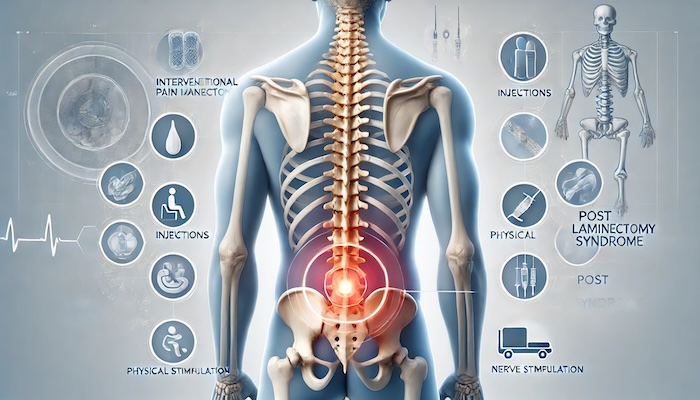
For many patients, spinal surgery, such as a laminectomy, offers the promise of relief from chronic back or leg pain. However, in some cases, pain persists or even worsens after surgery—a condition known as Post Laminectomy Syndrome (PLS). This complex syndrome can be both physically and emotionally challenging for those who anticipated a return to a pain-free life. Interventional Pain Management offers a range of solutions to help these individuals manage their discomfort and improve their quality of life.
What is Post Laminectomy Syndrome?
Post Laminectomy Syndrome, sometimes referred to as Failed Back Surgery Syndrome (FBSS), is a condition where pain remains or recurs after spinal surgery. Although surgery can successfully relieve certain sources of pain, some patients continue to experience symptoms due to various factors, including scar tissue formation, nerve damage, or spinal instability.
Symptoms of PLS can vary but generally include:
- Persistent or worsening lower back pain
- Radiating leg pain
- Muscle spasms
- Numbness or tingling in the limbs
While PLS is most commonly associated with laminectomy procedures, it can also occur after other types of spine surgeries. Studies estimate that up to 20% of spinal surgery patients experience some degree of ongoing pain, highlighting the need for effective post-surgical pain management.
How Interventional Pain Management Can Help
Interventional Pain Management focuses on non-surgical treatments designed to target the underlying causes of pain. For patients with PLS, these methods aim to reduce pain, restore mobility, and improve overall quality of life. Precision Pain Care and Rehabilitation uses a variety of advanced techniques to address PLS, including:
- Epidural Steroid Injections
These injections deliver anti-inflammatory medications directly into the spine to help reduce inflammation and alleviate pain. By targeting inflamed areas, patients can experience relief from nerve-related pain, which is common in PLS.
- Spinal Cord Stimulation (SCS)
SCS involves implanting a small device that sends electrical signals to the spinal cord, interrupting pain signals before they reach the brain. This treatment has shown significant success in providing long-term relief for patients who haven’t responded to traditional therapies.
- Radiofrequency Ablation (RFA)
RFA uses heat generated by radiofrequency energy to disrupt specific nerves’ ability to send pain signals. This technique can provide lasting relief for patients experiencing facet joint pain due to spinal degeneration after surgery.
- Physical Therapy and Rehabilitation
Physical therapy plays a crucial role in the recovery process, helping patients strengthen the muscles around the spine and improve flexibility. By enhancing stability and reducing strain on the affected area, physical therapy can help minimize post-surgical pain and improve functionality.
Real-World Impact: Patient Outcomes with Interventional Pain Management
Studies and patient outcomes at clinics such as Precision Pain Care and Rehabilitation reveal promising results for those who pursue interventional pain management for PLS. According to recent data, patients receiving spinal cord stimulation report up to a 50% reduction in pain, with many experiencing improved sleep and overall satisfaction. Epidural injections and RFA treatments similarly show benefits, with 60-70% of patients achieving significant pain relief.
Looking Forward: Managing PLS with a Holistic Approach
For individuals grappling with Post Laminectomy Syndrome, pain management isn’t just about physical relief—it’s about restoring independence, reducing the need for medication, and enhancing daily life. Through a combination of innovative treatments, personalized care plans, and rehabilitation support, interventional pain management offers hope for a more comfortable and fulfilling life after surgery.
While surgery can’t always provide complete relief from back pain, interventional pain management offers solutions that can help people move beyond pain and into the activities they love.
Precision Pain Care and Rehabilitation has two convenient locations in Richmond Hill – Queens, and New Hyde Park – Long Island. Call the Queens office at (718) 215-1888 or (516) 419-4480 for the Long Island office to arrange an appointment with our Interventional Pain Management Specialists, Dr. Jeffrey Chacko or Dr. Sonny Ahluwalia.















